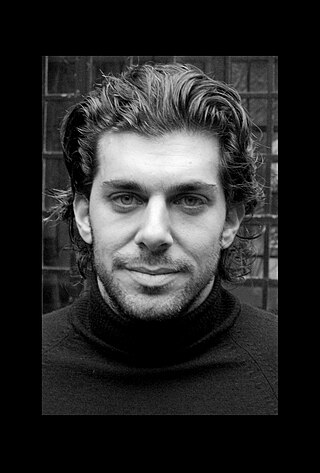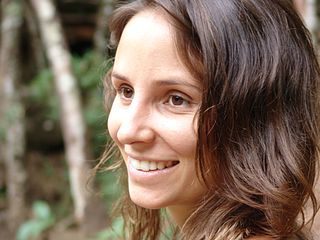
Lourdes Portillo was a Mexican film director, producer, and writer. The political perspectives of Portillo's films have been described as "nuanced" and versed with a point of view balanced by her experience as a lesbian and Chicana woman. Portillo films have been widely studied and analyzed, particularly by scholars in the field of Chicano studies.
Umoja, the Swahili word for "unity", may refer to:
Incite Pictures is a documentary film production company located in New York City, founded by Rose Rosenblatt and Marion Lipschutz Incite Pictures is the for profit arm of Cine Qua Non, a non-profit organization. In addition to national U.S. broadcasts, their work has been broadcast on the CBC's Passionate Eye in Canada, The BBC in England, NHK, Indian TV, and many other strands around the world. Their films have won Best Cinematography at The Sundance Film Festival, The Audience Award at SXSW, The Audience and Jury Award at Cine Las Americas, Best Documentary at Red Nation Film Festival, Best Documentary at Native Cinema Showcase, The Emerging Picture Award at Full Frame, and The Jury Prize for Best Documentary at The Miami Gay and Lesbian Film Festival. Personal recognition includes The Full Frame Women in Leadership Award, The Hugh M. Hefner First Amendment Award, and a nomination for the British Index on Censorship's Freedom of Expression Award. Though their topics have been specific to the United States, they have durable international appeal, showing in hundreds of festivals, including The Human Rights Watch Film Festival, Hot Docs, The Stockholm International Film Festival, The Seoul International Film Festival and The Festival de Rio de Janeiro.

Umoja Uaso is a village in Kenya. The village, founded in 1990, is an all-female matriarch village located near the town of Archers Post in Samburu County, 380 km (240 mi) from the capital, Nairobi. It was founded by Rebecca Lolosoli, a Samburu woman, as a sanctuary for homeless survivors of violence against women, and young girls running from forced marriages or female genital mutilation. The women of the Samburu people do not agree with violence and the traditional subordinate position of women.

Arnold Antonin is a Haitian film director. A man of diverse careers, Arnold Antonin is known both inside and outside Haiti for his social, political and cultural commitment. He was honored for lifetime achievement with the Djibril Diop Mambety award at the International Film Cannes Festival in 2002. He received the Paul Robeson African Diaspora best film award at FESPACO in Ouagadougou in 2007, 2009, and 2011. He also received numerous awards and accolades at festivals for his documentaries and fiction movies. He was president of the Haitian Filmmakers Association (AHC) from 2005 to 2009.
The Cinema of Niger began in the 1940s with the ethnographical documentary of French director Jean Rouch, before growing to become one of the most active national film cultures in Francophone Africa in the 1960s-70s with the work of filmmakers such as Oumarou Ganda, Moustapha Alassane and Gatta Abdourahamne. The industry has slowed somewhat since the 1980s, though films continue to be made in the country, with notable directors of recent decades including Mahamane Bakabe, Inoussa Ousseini, Mariama Hima, Moustapha Diop and Rahmatou Keïta. Unlike neighbouring Nigeria, with its thriving Hausa and English-language film industries, most Nigerien films are made in French with Francophone countries as their major market, whilst action and light entertainment films from Nigeria or dubbed western films fill most Nigerien theatres.

Margarita Cadenas, is a Venezuelan-French director, producer and screenwriter.
Carlos Casas is a filmmaker and artist whose practice encompasses film, sound and the visual arts. His films have been screened and awarded in festivals around the world, like the Venice Film Festival, International Film Festival Rotterdam, Buenos Aires International Film Festival, Mexico International Film Festival, CPH DOX Copenhagen, FID Marseille, etc... Retrospectives of his films have been presented international festivals and cinematheques from Madrid, Mexico to Bruxelles, his work has been exhibited and performed in international art institutions and galleries, such as Tate Modern in London, Fondation Cartier, Palais de Tokyo, Centre Pompidou in Paris, NTU CCA Singapore; Hangar Bicocca, and La Triennale in Milan, CCCB Barcelona, Matadero Madrid, Museo Nacional Centro de Arte Reina Sofía Madrid, MAAT Lisbon, GAM Torino, Bozar, Kunsten Festival des Arts Bruxelles … among others. He has collaborated with musicians and artists like Phill Niblock, Z'EV, Nico Vascellari, Prurient, Sebastian Escofet, Nastro Mortal.

Chilean cinema refers to all films produced in Chile or made by Chileans. It had its origins at the start of the 20th century with the first Chilean film screening in 1902 and the first Chilean feature film appearing in 1910. The oldest surviving feature is El Húsar de la Muerte (1925), and the last silent film was Patrullas de Avanzada (1931). The Chilean film industry struggled in the late 1940s and in the 1950s, despite some box-office successes such as El Diamante de Maharajá. The 1960s saw the development of the "New Chilean Cinema", with films like Three Sad Tigers (1968), Jackal of Nahueltoro (1969) and Valparaíso mi amor (1969). After the 1973 military coup, film production was low, with many filmmakers working in exile. It increased after the end of the Pinochet regime in 1989, with occasional critical and/or popular successes such as Johnny cien pesos (1993), Historias de Fútbol (1997) and Gringuito (1998).

Marcelo Mosenson is the founder and executive director of the film production company Nomade Films.

Petra Costa is a Brazilian filmmaker and actress. She has been a member of the Academy of Motion Picture Arts and Sciences since 2018. Her first documentary feature, Elena (2012), won major awards.

Marc-Henri Wajnberg is a Belgian film director born in 1953. He is also a screenwriter, an actor and the co-founder and CEO of Wajnbrosse Productions.

Forbidden Voices is a documentary film by director Barbara Miller about the fight for human rights and freedom of speech of three female bloggers: Yoani Sánchez from Cuba, Zeng Jinyan from China and Farnaz Seifi from Iran.
Sophie Deraspe is a Canadian director, scenarist, director of photography and producer. Prominent in new Quebec cinema, she is known for a 2015 documentary The Amina Profile, an exploration of the Amina Abdallah Arraf al Omari hoax of 2011. She had previously written and directed the narrative feature films Missing Victor Pellerin in 2006, Vital Signs in 2009, The Wolves in 2015,

Something Better to Come is a Danish-Polish documentary film about children living on a garbage dump near Moscow directed by Oscar-nominated filmmaker Hanna Polak and produced by Sigrid Dyekjær of Danish Documentary. Something Better to Come won the Special Jury Award at the IDFA documentary festival, where the film had premiered.
Hawa Essuman is a film director based in Nairobi, Kenya. Her 2017 feature-length documentary Silas, co-directed with Anjali Neyar, tells the story of Liberian environmental activist Silas Siakor's fight to preserve the country's rainforests from commercial logging. The film won multiple awards, including the Amnesty International Durban Human Rights Award (2018) and the Audience Award for best documentary at the RiverRun International Film Festival (2018). Hawa's first feature film, Soul Boy (2010), also received a series of awards. In addition, Hawa has produced a range of TV programmes, commercial films, music videos and adverts.

Rebecca Lolosoli is the founder and matriarch of the Umoja village in the Samburu County of Kenya. The village is a refuge for women fleeing sexual abuse, and men are banned from the village. She plans to run for local office and will be the first Samburu woman ever to do so.

Amal Ramsis is an Egyptian filmmaker. She studied directing at the International Film and Television School in Madrid.
Nobody Dies Here is a 2016 French documentary short film directed by Simon Panay. The film has been presented as World Premiere to the 20th Rhode Island International Film Festival where it won the First Jury Prize for Best Documentary.

Marcela Zamora Chamorro is a Salvadoran born-Nicaraguan documentary director and journalist. She has worked in El Salvador, Nicaragua, Mexico, Venezuela, and Cuba.













